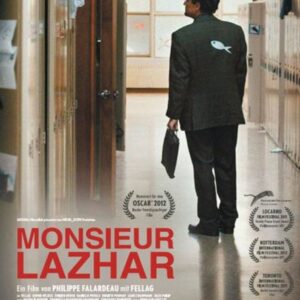Monsieur Lazhar, nominated for best foreign language film at the 2012 Academy Awards, explores the trust it takes to build a classroom community. In the hands of Canadian director Philippe Falardeau, it centers on Bachir Lazhar (Mohamed Fellag), an Algerian immigrant who steps in as a substitute when a teacher kills herself at a Montreal middle school.
The film opens with a powerful scene as 6th grader Simon (Emilien Neron), chosen to deliver the milk cartons to the classroom that morning, stumbles upon his teacher’s suicide. His classmate Alice (Sophie Nélisse), curious why the teachers suddenly start herding all of the students outside, also catches a glimpse through the classroom window. Both children are haunted by what they saw, wondering why their teacher would take her own life in their classroom and whether it was their fault.
This is where Monsieur Bachir Lazhar comes in, attempting to guide the students through the rest of the year in the wake of their grief. As it turns out, he is not what he claims to be — he is neither a real teacher nor a permanent resident of Canada. Over the course of the film, as Lazhar pursues his asylum case, details about his background slowly emerge, including the losses he suffered in the aftermath of the Algerian Civil War. It becomes clear that Lazhar’s students are not the only ones who need to heal.
Much of the film focuses on the subtle differences between Lazhar’s approach and the school’s — or more generally between Algerian and Canadian cultures. Lazhar is quite formal, insisting on reorganizing the semicircular desks into strict rows and requiring his eleven-year-old students to do dictation exercises from Balzac (a French novelist from the 1800s). He is also more physical with his students, willing to casually cuff a student for disobedience as well as give a child a hug who needs one. This results in a reprimand from the principal, who warns him that in Canada no physical touch is allowed between students and teachers. Lazhar also disagrees with the school’s policy of forbidding talk about the suicide except during the students’ designated sessions with a psychologist. A deeply intuitive person, he sees that the students want to be able to talk about what happened more openly than the school will allow.
Monsieur Lazhar is not a typical film about the power of teaching. Where another film might have written its protagonist as an outspoken champion of his students, Falardeau portrays a teacher who is quiet and traditional. Moreover, Monsieur Lazhar avoids simplifying the story into a clash between tradition and modernity. The film does critique the school’s overly strict and bureaucratic approach. Clearly, Lazhar’s empathetic approach gives the students the emotional support that they were missing. Yet some of the adults believe that Lazhar is crossing a line — one of the parents admonishes, “we prefer that you teach our daughter, not try to raise her.” Indeed, Lazhar’s old-school methods are sometimes out-of-place or even inappropriate in a 21st century Canadian classroom. Ultimately, the film does not wholly endorse either approach, but rather explores the subtleties of cultural difference in education.
The cinematography of Monsieur Lazhar is understated, much like its protagonist, with close attention toward the school as setting. A nostalgic piano theme accompanies frequent shots of the classrooms, hallways, and schoolyard. The filming draws a contrast between these spaces during the day — full of vitality and commotion — and the empty rows of desks at night, as Lazhar grades papers alone in the dark.
Although Monsieur Lazhar tackles some difficult subjects, it does so with grace and compassion.
Discussion Questions:
- Monsieur Lazhar focuses on differing views of what a teacher’s role should be in a student’s life. What do you see as the most important job of a teacher? What kind of place should school be?
- How is Lazhar’s experience of grief connected to that of his students?
- One of the parents remarks to Lazhar, “You’re not from here, so of course certain nuances escape you.” How does cultural difference and the immigrant experience affect the film? Consider both Lazhar and his students (some of whom are of non-Canadian origin).


